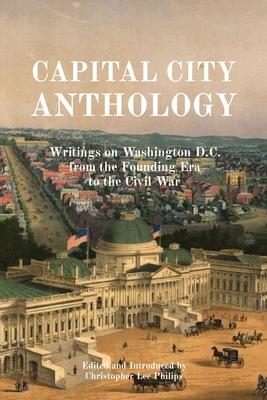CAPITAL CITY ANTHOLOGY
Edited and Introduced by Christopher Lee Philips
Washington, D.C., the "District of Columbia," has served as the permanent capital of the United States of America since 1800. From its post-revolutionary era founding through the American Civil War, the fledgling capital city slowly but persistently evolved from an ambitious plan conceived on paper into a rapidly expanding national metropolis. During this formative era, domestic and international observers captured the city's growth and development in their personal and published writings. Among these observers were journalists, novelists, poets, politicians, social activists, soldiers, spies, tourists, and travel writers. They came to the city from different states among the former English colonies. European visitors were often critical of the new capital city. Indeed, a few visitors came to the city with the expressed intention of writing about it. Some merely passed through the city as travelers enroute to other destinations, while others became brief, long-term, or even permanent residents. Those who stayed, however long, often had governmental duties to perform or business, diplomatic, and military affairs to administer. Although the capital city was first and foremost political in nature and purpose, a vibrant social life eventually flourished.
This Capital City Anthology presents excerpts from the writings of these contemporary observers as manifested in diaries, documents, histories, fiction, guidebooks, letters, memoirs, poetry, and travelogues. Taken together, they offer readers a chronologically arranged, first-person account of the early evolution of Washington, D.C. Included are excerpts from the writings of President George Washington, French engineer Pierre Charles L'Enfant, Secretary of State Thomas Jefferson, Treasury Secretary Oliver Wolcott, Jr., First Lady Abigail Adams, Irish poet Thomas Moore, Scottish mapmaker John Melish, enslaved White House servant Paul Jennings, British Army officer George Robert Gleig, English actor Tyrone Power, English travel writer Harriet Martineau, French diplomat Adolphe Fourier de Bacourt, New York diarist Philip Hone, English novelist Charles Dickens, American abolitionist Daniel Drayton, Swedish feminist Fredrika Bremer, Confederate spy Rose O'Neal Greenhow, American writers Louisa May Alcott and Walt Whitman, and many others.
